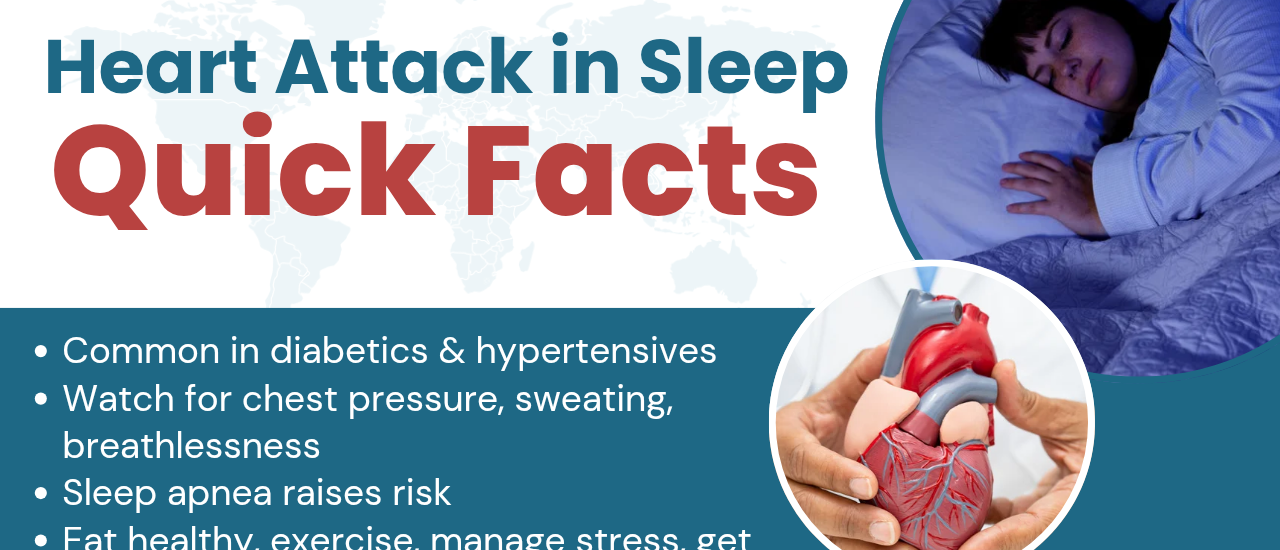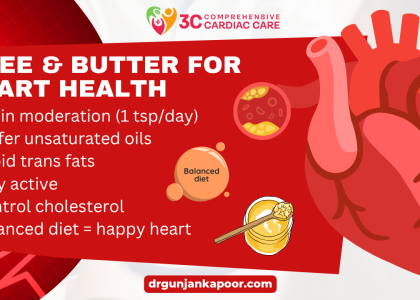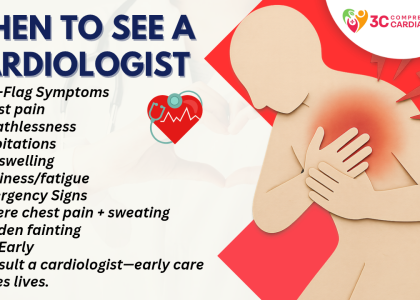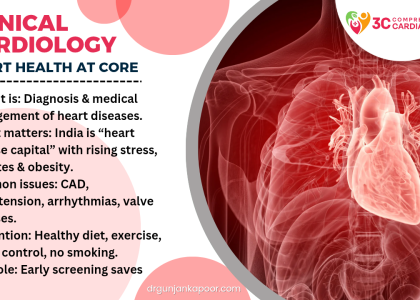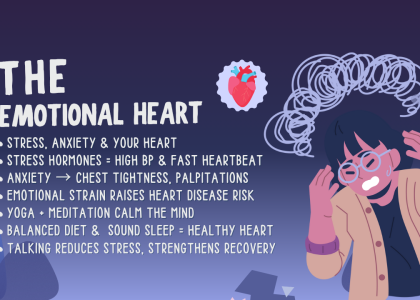A heart attack is one of the most serious medical emergencies. It happens when the blood flow to the heart suddenly stops, usually because of a blockage in the arteries that supply blood to the heart muscles. When this happens during the day, people often recognize the symptoms and rush to the hospital.
But what happens when it occurs silently — during sleep?
Heart attacks in sleep are real, and in India, many cases go unnoticed until it’s too late.
In this blog, we will understand why heart attacks can happen during sleep, what warning signs to look for, and how we can prevent them with simple lifestyle changes.
Why Can a Heart Attack Happen in Sleep?
When we sleep, our body slows down — the heart rate, blood pressure, and breathing become steadier. But for some people, especially those with heart disease, diabetes, high cholesterol, or high blood pressure, this time can become risky.
Here are some common causes and reasons behind heart attacks during sleep:
-
Blocked Arteries (Atherosclerosis):
Fat, cholesterol, and other substances can build up inside the arteries over time. This buildup, known as plaque, narrows the arteries and reduces blood flow. If a piece of this plaque breaks off at night, it can block blood flow suddenly — causing a heart attack. -
High Blood Pressure or Stress:
Even while sleeping, some people experience spikes in blood pressure due to stress, anxiety, or sleep disorders. This sudden increase puts extra strain on the heart. -
Sleep Apnea:
This is one of the major reasons behind night-time heart problems. Sleep apnea is a condition where a person repeatedly stops breathing for a few seconds during sleep. Each pause lowers oxygen levels and forces the heart to work harder. Over time, it can lead to heart attack or stroke. -
Uncontrolled Diabetes:
People with diabetes are at a higher risk because high blood sugar damages the blood vessels and nerves that control the heart. -
Obesity and Poor Lifestyle:
Eating late at night, smoking, drinking alcohol, and lack of exercise make the heart weaker and increase the risk of a silent heart attack. -
Medication or Drug Side Effects:
Some medicines, such as certain painkillers or sleeping pills, can slow the heart or affect blood pressure — making night-time heart attacks more likely in sensitive individuals.
Silent Heart Attack During Sleep — What Happens?
Many people don’t wake up after a heart attack in sleep because the symptoms are often mild or go unnoticed. Unlike the dramatic pain shown in movies, a heart attack in sleep can be quiet and slow.
Here’s what typically happens:
-
Blood flow to a part of the heart is blocked.
-
The affected part of the heart muscle begins to die.
-
Because the person is asleep, they may not feel or respond to the early warning signs.
-
If the blood flow isn’t restored in time, it can lead to death or severe heart damage.
Warning Signs of a Heart Attack During Sleep
Even in sleep, our body often gives signals. If you or someone in your family has heart problems, it’s important to be aware of these warning symptoms:
-
Chest Discomfort or Pressure:
Feeling heaviness, tightness, or burning in the chest — as if someone is sitting on it. Sometimes this pain spreads to the left arm, shoulder, jaw, or back. -
Shortness of Breath:
Waking up suddenly gasping for air or feeling like you cannot breathe properly. -
Sudden Sweating:
Unusual sweating while sleeping, especially if the room isn’t hot. -
Nausea or Vomiting:
Some people feel sick in the stomach or vomit during a heart attack. -
Dizziness or Light-headedness:
Feeling faint, weak, or confused suddenly in the middle of the night. -
Irregular Heartbeat:
A fast, slow, or uneven heartbeat can be a sign that the heart is struggling.
If any of these symptoms occur at night, wake up immediately and seek medical help. Do not wait for the morning or try to self-treat.
Who Is at Higher Risk?
In India, certain groups are more likely to face heart attacks during sleep, such as:
-
People above 45 years (men) and 50 years (women)
-
Those with high blood pressure or diabetes
-
Smokers and people who drink alcohol regularly
-
People with obesity or lack of exercise
-
Those who have high cholesterol or family history of heart disease
-
Individuals with sleep apnea or chronic stress
How to Prevent Heart Attack During Sleep
The good news is — prevention is possible. Simple lifestyle changes and regular medical checkups can reduce your risk dramatically.
Here’s what doctors recommend:
-
Check Your Health Regularly:
Get routine checkups for blood pressure, blood sugar, and cholesterol. Don’t ignore mild symptoms like chest heaviness or fatigue. -
Eat Heart-Healthy Food:
Choose more fruits, vegetables, whole grains, and low-fat dairy. Reduce fried foods, salt, and sugar. Avoid eating heavy meals late at night. -
Exercise Daily:
At least 30 minutes of brisk walking, yoga, or cycling can strengthen your heart. -
Maintain a Healthy Weight:
Obesity increases strain on the heart, especially while lying down. Losing even 5–10% of your weight can make a big difference. -
Quit Smoking and Limit Alcohol:
These habits directly damage your heart and blood vessels. -
Manage Stress:
Practice meditation, deep breathing, or spend time in relaxing activities. -
Sleep Properly:
Aim for 7–8 hours of sleep. If you snore loudly, wake up tired, or feel sleepy during the day, consult a doctor for possible sleep apnea. -
Take Medicines on Time:
If you are on medication for blood pressure, cholesterol, or diabetes, take them regularly as advised by your doctor.
When to See a Doctor Immediately
Never ignore warning signs such as:
-
Chest discomfort or pressure (especially with sweating or breathlessness)
-
Sudden fatigue without reason
-
Uneven heartbeat
-
Pain radiating to the neck, jaw, or arm
These could be signs that your heart needs help.
Final Thoughts
Heart attacks during sleep can be silent but deadly. Awareness is the first step toward prevention.
By adopting a healthy lifestyle, managing stress, and going for regular checkups, you can protect your heart — and your sleep.
Remember:
Your heart works 24 hours a day for you — take care of it even while you rest.

